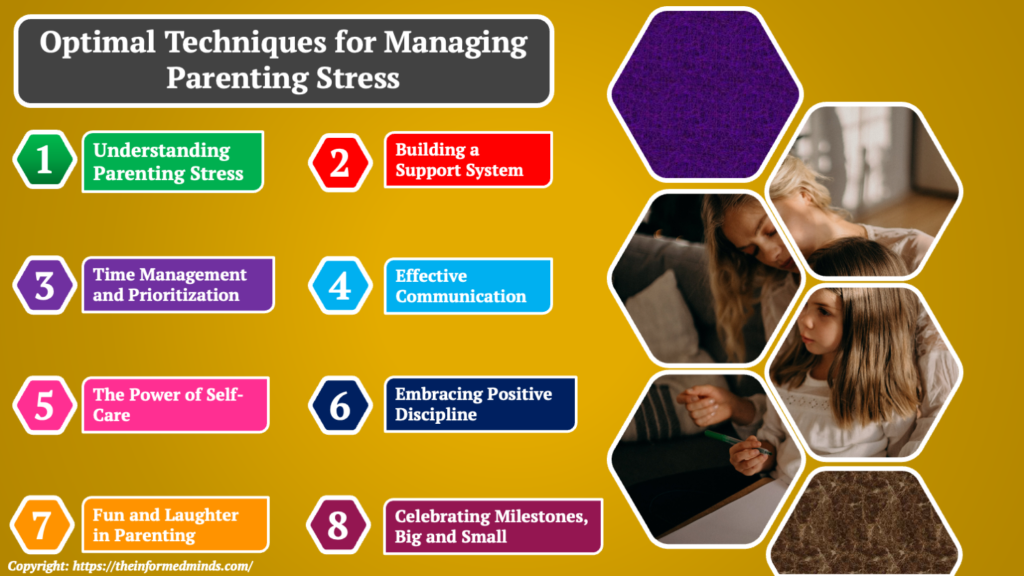To Share is to Show You Care!
In the rollercoaster journey of parenting, stress is an inevitable companion. However, armed with the right tools, you can transform challenges into opportunities for growth and connection. This ultimate guide is designed to help you become the best parent, navigating the tumultuous waters of parenthood with love and laughter.

1. Understanding Parenting Stress

Define the sources of parenting stress: Begin by identifying the specific aspects of parenting that cause stress. This could include financial pressures, lack of sleep, balancing work and family, or managing behavior issues in children.
Recognize common stress triggers: Explore common situations that tend to trigger stress in parents. Understanding these triggers is the first step in managing and mitigating stress.
Explore the impact of stress on both parents and children: Examine how stress can affect both parental well-being and children’s development. This awareness is crucial for implementing effective coping strategies.
2. Building a Support System
Identify your support network: Recognize individuals in your life who can provide emotional support and practical help. This may include family members, friends, or fellow parents.
Strengthen relationships with family and friends: Cultivate strong connections with your support network. Open communication lines and express your needs, creating a reciprocal and supportive environment.
Join parenting communities for shared experiences and advice: Explore online or local parenting communities where you can share experiences, gain insights, and receive advice from others facing similar challenges.

3. Time Management and Prioritization

Develop a realistic daily schedule: Create a daily schedule that considers both parental responsibilities and personal needs. Realism is key to avoid setting yourself up for failure.
Prioritize tasks to avoid feeling overwhelmed: Identify and prioritize tasks based on urgency and importance. This helps prevent a sense of overwhelming pressure and allows for more effective time management.
Allocate quality time for both parenting and self-care: Balance is crucial. Allocate dedicated, quality time for parenting duties while also ensuring you reserve time for self-care activities that rejuvenate and refresh you.
4. Effective Communication
Enhance communication with your partner: Foster open and honest communication with your partner to ensure you are on the same page regarding parenting strategies, concerns, and support needs.
Establish open channels with your children: Create an environment where your children feel comfortable expressing themselves. Open communication promotes understanding and helps address potential sources of stress.
Seek professional help if needed: If communication challenges persist, consider seeking the assistance of a professional, such as a family therapist, to facilitate effective communication within the family.

5. The Power of Self-Care

Emphasize the importance of self-care: Highlight the significance of self-care for maintaining physical and mental well-being. This includes activities such as exercise, hobbies, and relaxation techniques.
Share practical self-care tips for parents: Provide concrete examples of self-care practices that parents can easily incorporate into their routines, considering the constraints of a busy lifestyle.
Explain how self-care positively influences parenting: Connect the dots between self-care and effective parenting, emphasizing that a well-cared-for parent is better equipped to handle the challenges of raising children.
6. Embracing Positive Discipline
Discuss the concept of positive discipline: Explain the principles behind positive discipline, focusing on teaching children self-control and responsibility rather than punitive measures.
Provide examples of effective discipline strategies: Offer practical examples of positive discipline, such as setting clear expectations, using positive reinforcement, and implementing logical consequences.
Explain the long-term benefits of positive discipline: Emphasize the lasting impact of positive discipline on a child’s development, including improved self-esteem, enhanced problem-solving skills, and healthier parent-child relationships.

7. Fun and Laughter in Parenting

Highlight the role of laughter in reducing stress: Explore how laughter can be a powerful tool for diffusing tension and promoting a positive atmosphere within the family.
Share creative and enjoyable activities for families: Provide a list of activities that encourage laughter and bonding, such as game nights, family outings, or simple, light-hearted traditions.
Emphasize the importance of creating joyful memories: Stress the significance of creating lasting memories through shared laughter and enjoyable experiences, contributing to a positive family culture.
8. Celebrating Milestones, Big and Small
Acknowledge and celebrate parenting achievements: Encourage parents to recognize and celebrate their successes, no matter how small. This fosters a sense of accomplishment and boosts morale.
Encourage setting realistic goals: Advocate for the establishment of achievable parenting goals, promoting a sense of progress and preventing the discouragement that can arise from setting overly ambitious expectations.
Reflect on the positive aspects of your parenting journey: Prompt parents to reflect on the positive moments and personal growth experienced in their parenting journey, reinforcing a positive mindset and resilience in the face of challenges.

Parenting Books and Guides
Consulting parenting books is vital for stress-free home management with kids. These resources offer valuable insights, practical tips, and evidence-based strategies, empowering parents to navigate challenges effectively. By incorporating expert advice, parents can enhance their understanding, build confidence, and foster a harmonious environment for both themselves and their children.
| What makes this book a worthy purchase? a) Practical Techniques: Easy-to-use strategies for immediate stress reduction. b) Diverse Applications: Applicable tips for parents, educators, and caregivers. c) Positive Impact: Readers report tangible improvements in family dynamics. d) Holistic Approach: Addresses both parent and child stress management. e) Expert Endorsement: Recommended by professionals for its effectiveness. | What makes this book a worthy purchase? a) Transformative Insights: Breaks down anger cycles, fostering positive parent-child connections. b) Concrete Techniques: Practical methods for disrupting unproductive anger patterns. c) Intimacy Building: Reframes anger as a tool for increased intimacy. d) Self-Reflection: Helps identify triggers and promotes self-awareness for growth. e) Holistic Parenting Guide: Empowers parents to manage anger, nurture well-behaved kids. | What makes this book a worthy purchase? a) Comprehensive Blueprint: Offers a practical and insightful guide for parents. b) Practical Strategies: Provides step-by-step techniques for anger management. c) Positive Reinforcement: Emphasizes constructive discipline and positive reinforcement. d) Relationship Repair: Focuses on rebuilding trust after conflicts with practical steps. e) Psychological Insights: Offers educational insights into child psychology for effective | What makes this book a worthy purchase? a) Essential Insights: Gain valuable insights for better parenting skills. b) Practical Techniques: Learn effective ways to manage anger positively. c) Root Cause Understanding: Understand triggers and handle explosive parenting. d) Empathetic Approach: Author’s empathetic guidance for nurturing children. e) Holistic Transformation: Shift mindset towards positive, harmonious parenting. |
Stress-balls
Amidst the parenting whirlwind, stress-balls emerge as saviors. These simple tools offer instant relief, allowing parents to squeeze away tension and regain composure. With the therapeutic benefits of stress-balls, managing the highs and lows of parenting becomes a tactile and stress-free experience.
| What makes this Stress Ball a worthy purchase? · Cute Gift: Perfect for employee gift bags or office giveaways. · Stress Relief: Ideal for work, these balls effectively relieve stress. · Entertainment: Fun for throwing at co-workers, adding joy to work. · Express Feelings: Squish away emotions with funny face expressions. · Quality and Size: Durable, cute, and fits well in the hand. | What makes this Stress Ball a worthy purchase? · Big Sayings: Small balls, big motivational quotes make an impact. · Event Hit: A hit at college events, great giveaways. · Stress Relief: Squeeze away stress with these quality balls. · School Campaigns: Ideal for school campaigns, loved by kids. · Fun Gift: Colorful assortment, perfect gift for staff and colleagues. | What makes this Stress Ball a worthy purchase? · Motivational Boost: Great for inspiration, motivation on-the-go. · Speaker’s Aid: Perfect for speakers to engage and motivate. · Quality Motivation: Well-made, quality items for motivation needs. · Affordable Giveaways: Ideal for promotions, events; unbeatable price. · Office Hit: Popular office item for stress relief and entertainment. | What makes this Stress Ball a worthy purchase? · Versatile Gift: Perfect for parties, young and old. · Inspirational Boost: Encouraging sayings for motivation. · Office Essential: Ideal for stress relief during meetings. · Adorable and Durable: Cute, well-made stress relief items. · Mental Health Awareness: Great for promoting well-being at work. |
Conclusion
Summarize the key takeaways from the guide, reiterating the importance of understanding stress, building a support system, effective time management, communication, self-care, positive discipline, and fostering joy in parenting. Encourage readers to implement these strategies gradually, recognizing that the journey to becoming the best parent is a continuous process of learning and growth.
Frequently Asked Questions
Q1: How do you handle stress in parenting?
A: Parenting stress can be managed through a combination of strategies. Identifying stress triggers, building a support network, and incorporating self-care routines are essential. Additionally, effective communication with your partner and children, along with adopting positive discipline practices, contributes to a healthier parenting experience.
Q2: How do you deal with stress when you have kids?
A: Coping with stress while raising kids involves creating a realistic daily schedule, prioritizing tasks, and fostering open communication. Building a strong support system, practicing self-care, and embracing positive discipline are integral components of effectively managing stress.
Q3: Why do I find parenting so stressful?
A: Parenting stress may arise from factors like unrealistic expectations, lack of support, and the constant juggle of responsibilities. Understanding these stressors and implementing coping mechanisms, such as seeking support and setting realistic goals, can help alleviate the pressure.
Q4: How do you deal with parental pressure?
A: Managing parental pressure requires setting achievable goals, communicating openly with your partner, and seeking support from friends and family. Embracing positive discipline methods and celebrating your parenting achievements can also contribute to easing the pressure.
Q5: What is depleted mother syndrome?
A: Depleted mother syndrome describes the exhaustion experienced by mothers who consistently prioritize the needs of others over their own. Recognizing the importance of self-care, setting boundaries, and seeking support are vital for preventing and addressing this syndrome.
Q6: What is parental burnout?
A: Parental burnout is a state of chronic physical and emotional exhaustion resulting from the demands of parenting. It emphasizes the need for parents to balance responsibilities, seek support, and prioritize their own well-being to prevent long-term burnout.
Q7: When parenting becomes overwhelming?
A: Parenting can become overwhelming due to a variety of factors, such as lack of support, unrealistic expectations, and high stress levels. Implementing stress management techniques, seeking help, and prioritizing self-care are essential during overwhelming periods.
Q8: How do I destress my motherhood?
A: Destressing motherhood involves creating a support system, practicing self-care, and setting realistic goals. Embracing positive discipline, finding joy in parenting, and celebrating achievements contribute to a more fulfilling and less stressful motherhood experience.
Q9: Why do I feel so overstimulated as a mom?
A: Feeling overstimulated as a mom can result from constant demands, lack of personal time, and high expectations. Managing stimuli, establishing routines, and taking breaks can help alleviate this feeling, promoting a healthier balance in daily life.
Q10: What is the hardest year of parenting?
A: The difficulty of parenting varies, but the early years, particularly the first year with a newborn, often pose unique challenges. Each developmental stage presents its own set of difficulties, requiring adaptability, patience, and a supportive network.
Q11: What is the most stressful period of parenting?
A: While stress levels can vary, the teenage years are often considered a challenging period of parenting. Increased independence, potential conflicts, and the need for effective communication become crucial during this phase.
Q12: What stresses moms out the most?
A: Moms may face stressors such as societal expectations, lack of support, and the pressure to balance work and family responsibilities. Addressing these stressors through self-care, communication, and seeking support can help alleviate the strain.
Q13: How parents affect their child’s mental health?
A: Parents significantly influence their child’s mental health through emotional support, a positive environment, and modeling healthy coping mechanisms. Regular communication and involvement in a child’s life contribute to their overall well-being.
Q14: How do I stop being an overbearing parent?
A: Avoiding being an overbearing parent involves practicing active listening, allowing for autonomy, and setting reasonable expectations. Balancing guidance with independence and fostering open communication can contribute to a healthier parent-child relationship.
Q15: Why do my parents expect so much from me?
A: Parental expectations may arise from a desire for their child’s success and well-being. Engaging in open communication about individual goals and limitations can help manage expectations and promote a healthier, more understanding parent-child relationship.
The Informed Minds
I'm Vijay Kumar, a consultant with 20+ years of experience specializing in Home, Lifestyle, and Technology. From DIY and Home Improvement to Interior Design and Personal Finance, I've worked with diverse clients, offering tailored solutions to their needs. Through this blog, I share my expertise, providing valuable insights and practical advice for free. Together, let's make our homes better and embrace the latest in lifestyle and technology for a brighter future.

